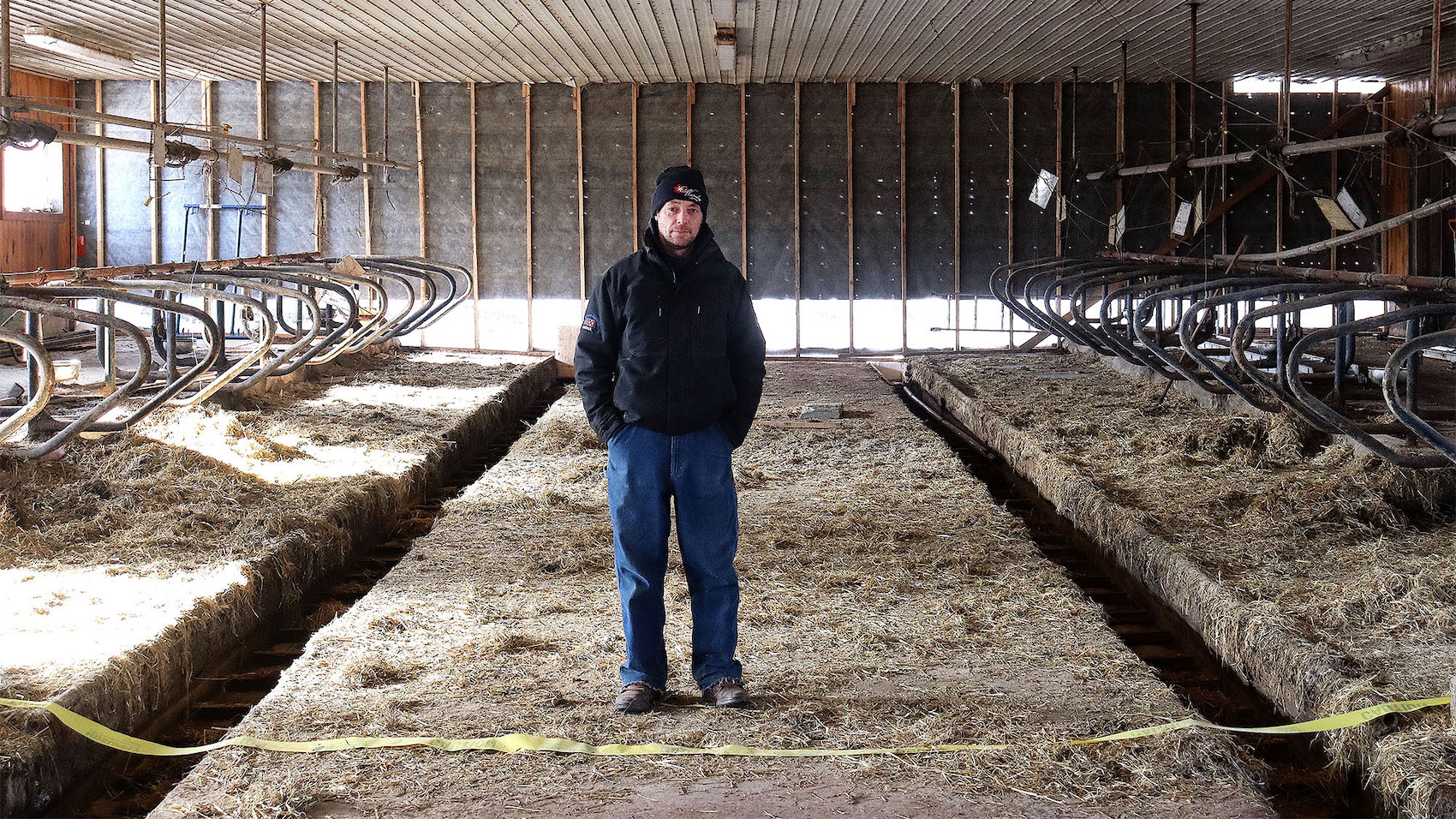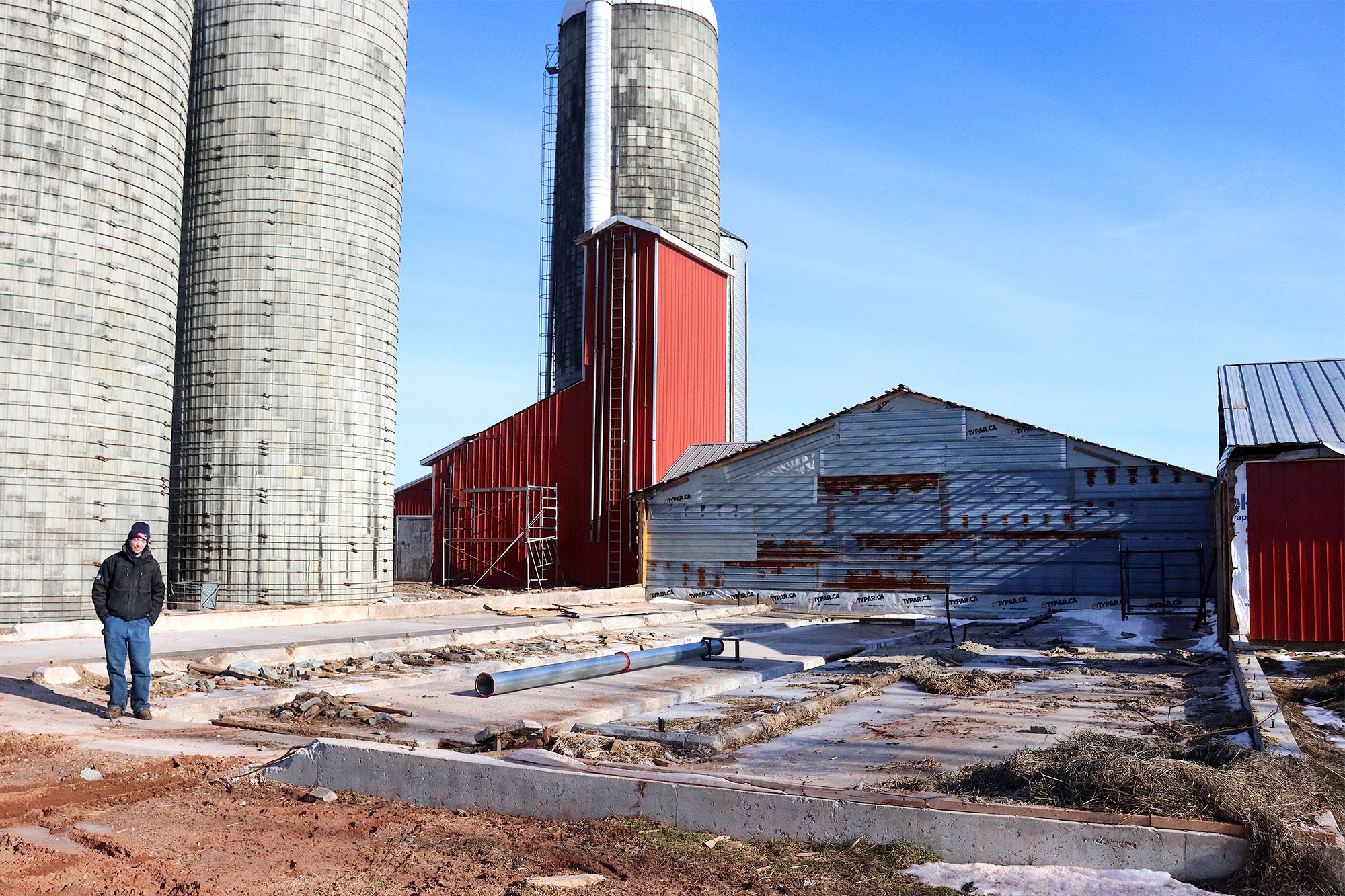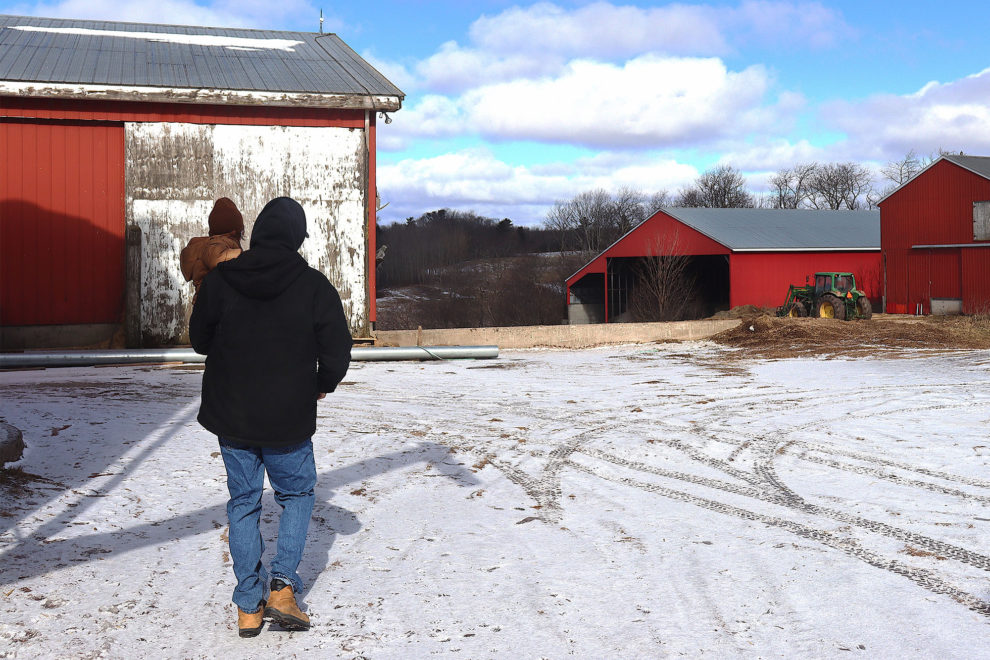Organic response to a growing crisis

caption
Jeff Bysterveldt of Bedford, P.E.I. in his former milk barn. Behind the back wall was where one of his silos collapsed through the barn's roof during Hurricane Fiona. 26 of his cows died in the incident.Canadian farmers are working to understand – and improve – their mental health
Jeff Bysterveldt couldn’t sleep. His farmhouse rocked left and right in furious 130 km/h winds. With that racket, it was impossible to gauge what was happening across the laneway.
He finally crawled out of bed around 4 a.m. Milking time was soon for his 104 cows – starting even half an hour late was enough to make them moo to the heavens in annoyance.
First order of business: check the generator. Electricity was flickering in and out, but something had to be reliable enough to run the milk pumps and water lines.
Slipping on his barn boots and stepping onto the front porch, Bysterveldt could see shingles and metal littering the farmyard. But the greatest concern was what wasn’t there: two 70-foot silos behind the milking barn.
“Oh s–t,” he gasped. “They’re down.”
Pushing through the wind and driving rain, he found one silo had crashed onto the south end of his barn – right where his cows slept.
Have you seen a TV commercial featuring a farmer lately? The sun’s rays paint acres of fields with light, while farmers and their families pose in work clothes with just-as-bright grins.
But farming isn’t all sunshine and smiles. Machinery constantly breaks. Workdays are long and often lonely. (There aren’t any water-cooler debates at the barn.) And for some, such as fruit growers, all of a year’s income could come down to one harvest. If crops don’t pan out then, well, that could sink the farm.
Even so, you’ll rarely hear farmers – proud of their backbreaking work – complain about their job’s demands. Even if something is wrong.
It took a road trip with his wife for David Newcombe to realize that his routine on the farm wasn’t healthy.
Cornwallis Farms in Port Williams, N.S. – where Newcombe’s family has farmed since the 18th century – raises chickens and dairy cows. The job is most demanding during late summer harvests, pushing him to burnout. “On the longer days,” he says, “you just sit there and wonder, ‘Is this day ever going to end?’”
The 2022 Guelph study measured burnout in three ways: cynicism, emotional exhaustion and professional efficacy, or ease of completing work. In each, farmers fared worse than the general population.
It’s not that Newcombe didn’t know something was wrong —he just wasn’t sure it was worth sharing. Near his most burnt-out state, he and his now-wife – not married at the time – jumped in the car to go for a drive. The couple travels with the radio off – a way to spark conversation. She began sharing some of the feelings she was juggling. From there, they dug a little bit deeper. “That gave me the confidence to open up about what I was feeling.”

caption
David Newcombe with his 18-month-old son Kane.Farmers pride themselves on a hard day’s and year’s work – plus the fact that they feed the country. They’re also independent, often working alone on their chores. By the very nature of farming, the stigma against speaking out is loud.
Last year, the Journal of Mental Health asked farmers from the southern United States about mental health stigma in their work. Ninety-three per cent said they’d never visited a mental health professional. Along with the social turmoil of making an appointment – word spreads fast in small towns and down backroads – it wasn’t always easy to schedule one. Too busy.
Newcombe knows Nova Scotian farmers confront similar barriers. So in 2021 he helped establish We Talk We Grow. It’s a program developed by Farm Safety Nova Scotia, an arm of the Nova Scotia Federation of Agriculture, which advocates for farmers. The program guides farmers to workshops and mental health supports including a 24/7 hotline.
We Talk We Grow is among several new programs for farmers’ mental health in Canada. Ontario’s version – the Farmer Wellness Initiative – launched in 2019. It too encourages farmers with mental health concerns to talk with someone, whether to peers in person or to a professional by phone.
Even with recent progress, the stigma continues – on both sides of the border. One southern U.S. respondent stated, “[It is] easier to go to the beer store than ask for help.”

caption
Little remains of Jeff Bysterveldt’s milk barn.After Jeff Bysterveldt’s silo collapsed, ruining his main barn, he had to move his milking herd to other farms in eastern P.E.I. The last of his surviving cattle boarded a trailer at about 3 p.m.
The final cow left after almost 12 hours of adrenaline-driven work – the cows had to be saved by getting them out and past blowing sheet metal and trees on the roads.
That adrenaline streak made the whole weekend a blur, Bysterveldt said. He was so caught up that he didn’t eat until 9 p.m. that night. He was then up at 6 a.m. the next day – after working for 18 hours and, before that, having a sleepless night. “You have a million things running through your mind,” he says, “and you don’t know where to start first.”
After twelve days without power, a week-long corn harvest (none of which Bysterveldt could keep; his corn silo was the one that collapsed) and a tidied mountain of rubble later, things began to slow down.
Several months later Bysterveldt, as before, is busy driving his New Holland tractor and delivering grain to his cows (in a different barn). In a way, the adrenaline continues. He says he “can’t sit and mull on the negatives. Otherwise, I’d be stuck there forever.”
Bloyce Thompson was one of 20 people lending a hand at Bysterveldt’s farm the morning of Fiona. He runs Eastside Holsteins, the closest dairy to Winterbay. He’s helped friends move cows before in times of trouble. The most distressing was in 2018; the farmer and friend whose cows he was moving had just died of suicide.
Thompson took a group of his friend’s cows to a Nova Scotia farm – a six-hour round-trip. He went alone.
“It was a long trip,” Thompson recalls. “I did a lot of soul searching.”
In 2017, Lesley Kelly and her farmer husband Mathieu filmed a video. It detailed their battles with anxiety, depression and, in Mathieu’s case, panic attacks brought on by problems on the farm.
The Kellys had just finished not only a poor cropping season, but one where Mathieu had to commute two hours to the farm each day from home in Regina, Sask. The family – Mathieu, Lesley and their two kids – didn’t yet have a house on the farm.
After the experience – and learning about the suicide of a farmer close to them – they shot the video. It drew more than 8,000 views in its first month.
Inspired by the video’s reach, Kelly in 2018 helped establish the Do More Agriculture Foundation. Funded by donations and merchandise sales, Do More has provided information and training about mental health to Canadian farmers – sometimes collaborating with We Talk We Grow and other organizations.
Do More’s launch event – a discussion featuring Kelly and other farmers – drew more than 400 people. But her attention wasn’t on the crowd; as she spoke, a farmer leaned against the wall at the back of the room, hat and head tilted down. Kelly says he looked “upset through the whole session.”
Once everyone had left he approached Kelly to thank her. She asked why. He said, “You just saved my life. I’m going to go home and talk to my wife.”
That experience shifted how Kelly and her team approach Do More’s mission. The organization doesn’t just provide a hotline, although that’s important. It fosters discussion between farmers.
Following Fiona’s destruction in Atlantic Canada, that was needed. The Nova Scotia Federation of Agriculture (NSFA) organized a series of town hall meetings in the province’s east, where the storm hit hardest. More than 70 farmers made it to at least one of the town halls. The conversations started out around the destruction they just faced, but turned to farmers’ overall mental health.
Importantly, a psychologist – with a farming background – was there to hear from farmers. That’s been another challenge in promoting farmers’ mental health: finding medical professionals who understand farming.
Alicia King of Antigonish, the NSFA’s first vice-president, said it’s key to have understanding between the two. For instance, a farmer typically can’t take a break from work in the middle of a busy time, such as harvest. “We never really leave the farm,” King said. “Which is okay, to a certain degree.” So a psychologist working with a farmer must find a different solution.

David Newcombe knows the importance of farmers talking with one another. It took him a long time to discuss mental health with other farmers. But the benefit – a common understanding of their challenges – is rewarding.
“You don’t always have to go for a professional,” he said, “but you can’t do everything yourself.”
Jeff Bysterveldt of P.E.I. is now busy rebuilding his farm. For 15 hours a week – about the time needed each week to milk his cows – he cozies up at his kitchen table to crunch numbers for a new barn. He wants to finish the project, usually a two or three-year undertaking, before next winter. It’s not cheap either, with a price tag of at least $3 million. That’s double the cost of similar projects 20 years ago.
This is all new for Bysterveldt. No other work is being done on the farm when he’s busy weighing the price of lumber against that of cement. All of the planning, he said, “makes my head spin.”
Farmers’ sense of accomplishment comes from what they do physically every day. “You can see at the end of the day that, ‘This is what we got done,’” Bysterveldt said. “When that’s kind of taken away from you, that end-of-the-day gratification’s not there.”
The halt in most of his work has been a shock. Dealing with that is his challenge for the coming year.
About the author
Luke Dyment
Luke Dyment is a Halifax-based reporter from Prince Edward Island. He has written for the Globe and Mail, The Signal and the Dalhousie Gazette....
